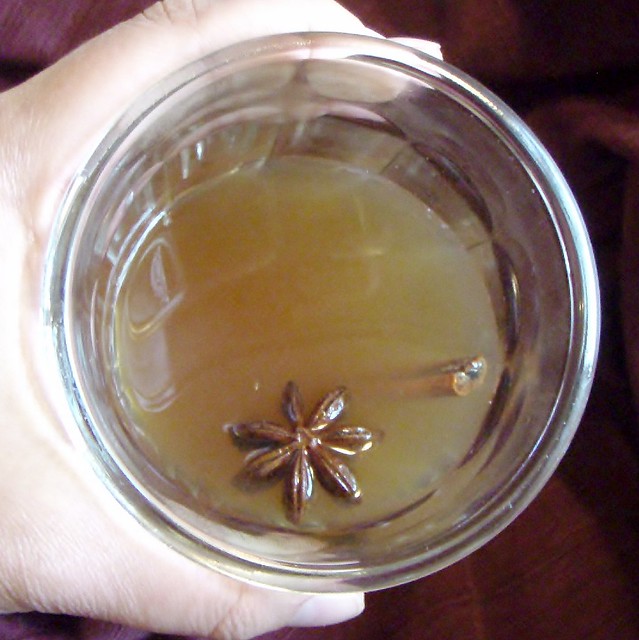Spicing up your apple cider means that you can get away with a lesser-quality pasteurized cider (I'll leave adding the booze to you, bourbon or applejack are good options!) and still have a delicious hot drink. Do try to use apple cider and not apple juice (there is no legal distinction between apple cider and apple juice, but typically cider refers to unfiltered apple juice - it should be opaque.)
If you live in the Food Desert, you may have to resort to purchasing these spices online - however, whole spices last a very, very long time and these are standards that you'll want in your cupboard during the holiday season.
1 gallon of apple cider
8 allspice berries
4 whole cloves
4 star anise
(I prefer the flavor, it's subtler - you can sub 1/8 tsp whole anise seed)
4 cinnamon sticks (or 1/4 tsp ground cinnamon)
1 chunk (about a 1" piece or equivalent) candied or crystallized ginger
Pour the apple cider into a large pot and add the spices. Bring to a simmer, and then turn the heat to low. Allow to steep for at least 1/2 hour before serving. (You can also do this in your slow cooker.)
Take a deep breath and enjoy the fragrance in your house. Serve with a ladle to avoid putting fiddly spice bits in people's mugs and garnish with a cinnamon stick and anise flower, if desired.







2 comments:
Persons who actually live in a food desert may not have on-line access or funds to order spices.
Actually, the issue is less access and more education: most urban areas have a spice specialty store that will ship, usually listed in the phone book - a search of Chicago Yellow Pages offers 43 hits under "spices," Detroit offers 18. In addition, many large chain stores offer spices mail order via phone/catalogue (Kmart, Walmart, etc.)
Most food deserts, though they don't have large chain grocers, do have public services like community centers and public libraries where there is free internet access. In addition, people with smartphones can access the internet at most of the fast-food chains that are so prevalent in the food desert (and many, many people of limited means have phones that can access the internet.)
You are right, the bigger issue with the foods on this blog is cost: for instance, the whole spices in this recipe are expensive if you don't have access to a car (they're usually cheaper in small ethnic markets.) Same goes for canned foods like artichokes, etc. This blog is expressly about using what is available, and does not address this particular factor.
Post a Comment